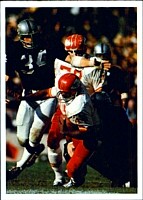Division races
In its final two years of existence, the AFL had ten teams, grouped into two divisions. Each team played a home-and-away game against the other four teams in its division, a home-and-away series against one of the five teams in opposite division, and one game each against the remaining four teams from the opposite division. Using that format, the defending World Champion New York Jets went 10–0 against the five teams they played twice, but were 0–4 against the top four teams in the West.
For the 1969 season, a provision was made for a four-team playoff to determine the AFL champion, the league's representative in the Super Bowl, with the #1 team in the division hosting the #2 team in the opposite division. The NFL also had a four-team playoff, introduced in 1967, matching the winners of the Capitol and Century divisions, and the Coastal and Central divisions.
The 1970 merger placed the ten AFL teams (along with three teams from the pre-1970 NFL) into the 13-team AFC. The other NFL teams went into the 13-team NFC.
| Week | Eastern #1 | | Eastern #2 | | Western #1 | | Western #2 | |
|---|
| 1 | N.Y. Jets | 1–0–0 | Hou, Bos, Buf, Mia | 0–1–0 | Oak, KC, Den, Cin | 1–0–0 | Oak, KC, Den, Cin | 1–0–0 |
| 2 | Hou, NY | 1–1–0 | Hou, NY | 1–1–0 | Oak, KC, Den, Cin | 2–0–0 | Oak, KC, Den, Cin | 2–0–0 |
| 3 | Houston | 2–1–0 | NY, Buf | 1–2–0 | Oak, Cin | 3–0–0 | Oak, Cin | 3–0–0 |
| 4 | Houston | 3–1–0 | N.Y. Jets | 2–2–0 | Oakland | 3–0–1 | Kansas City | 3–1–0 |
| 5 | NY, Hou | 3–2–0 | NY, Hou | 3–2–0 | Oakland | 4–0–1 | Kansas City | 4–1–0 |
| 6 | N.Y. Jets | 4–2–0 | Houston | 3–3–0 | Oakland | 5–0–1 | Kansas City | 5–1–0 |
| 7 | N.Y. Jets | 5–2–0 | Houston | 4–3–0 | Oakland | 6–0–1 | Kansas City | 6–1–0 |
| 8 | N.Y. Jets | 6–2–0 | Houston | 4–4–0 | Kansas City | 7–1–0 | Oakland | 6–1–1 |
| 9 | N.Y. Jets | 7–2–0 | Houston | 4–4–1 | Kansas City | 8–1–0 | Oakland | 7–1–1 |
| 10 | N.Y. Jets | 7–3–0 | Houston | 4–4–2 | Kansas City | 9–1–0 | Oakland | 8–1–1 |
| 11 | N.Y. Jets | 8–3–0 | Houston | 5–4–2 | Oakland | 9–1–1 | Kansas City | 9–2–0 |
| 12 | N.Y. Jets | 8–4–0 | Houston | 5–5–2 | Oakland | 10–1–1 | Kansas City | 10–2–0 |
| 13 | N.Y. Jets | 9–4–0 | Houston | 5–6–2 | Oakland | 11–1–1 | Kansas City | 11–2–0 |
| 14 | N.Y. Jets | 10–4–0 | Houston | 6–6–2 | Oakland | 12–1–1 | Kansas City | 11–3–0 |
This page is based on this
Wikipedia article Text is available under the
CC BY-SA 4.0 license; additional terms may apply.
Images, videos and audio are available under their respective licenses.

